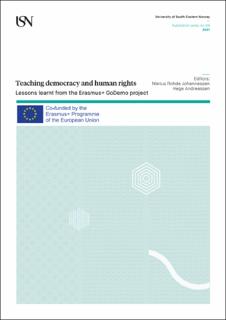Teaching democracy and human rights: Lessons learnt from the Erasmus+ GoDemo project
Report
Published version
Permanent lenke
https://hdl.handle.net/11250/2727719Utgivelsesdato
2021Metadata
Vis full innførselSamlinger
Sammendrag
In this publication, we present a summary of the Erasmus+ project "GoDemo". GoDemo was a strategic partnership between Vestfold county council, Vestfold museum, the University of South-Eastern Norway, Nøtterøy upper secondary school (all Norway), Zespol szkol nr 1 im. Powstancow wielkopolskich w Swarzedzu (Poland), Helen-Keller Schule Weinheim (Germany), Provincia di Livorno Sviluppo (Italy) and the Moderna museet Malmö (Sweden). The main objective of the project was to share good practices and exchange ideas related to teaching democracy and human rights in secondary schools across Europe. The starting point for the project was Vestfold Museum’s novel teaching methods related to the Holocaust, and a wish to expand on them to create new pedagogical methods for democracy and human rights in general, rooted in the European historical context.
The project ran from September 2017 to December 2020. Covid-19 led to an extension and unfortunately, we had to have the final meeting online instead of physically in Malmö, Sweden. During this time, we held two workshops (1 preparatory) in Norway and one in each of the partner countries. In the workshops we conducted a series of activities: We followed a design thinking approach to generate common understanding of the project and its outcomes. We went on a range of site visits to learn more about the historical context of democracy development and challenges in each country. We had students from university level and pupils from secondary schools collaborate on creating a demo application for digitalization of democracy teaching, and presentations and discussions of our various approaches to teaching.
In this publication, we summarize the workshops, activities, and teaching activities, in the hope that others will find it useful in their own efforts to teach democracy and human rights in schools – something which perhaps is more important now than it has been since the 1930s.

